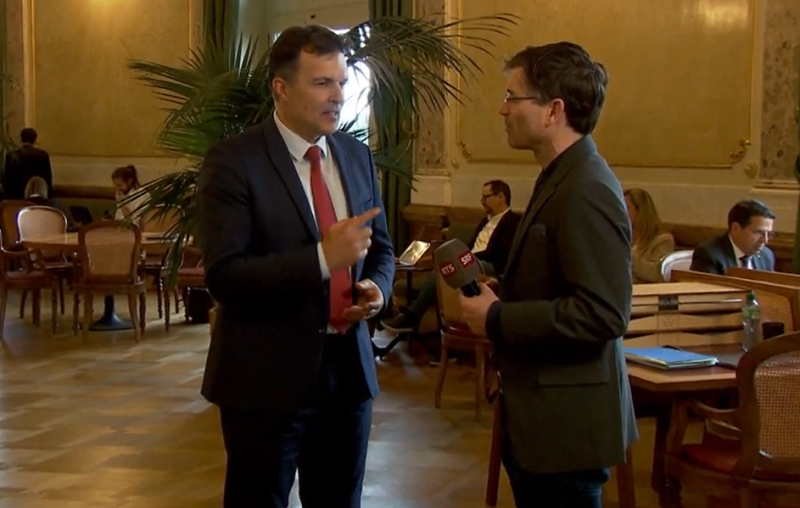“Every person has something to give”, says evangelical parliamentarian Marc Jost, who helped secure approval for the initiative in the Swiss parliament.
![A demonstration on 3 May 2025 in Zurich asking for all mentally impaired people to be given the right to vote. / Photo: Video still of [link]SRF[/link].](https://cms.evangelicalfocus.com/upload/imagenes/6819db9de56c0_protesta940Cropped.png) A demonstration on 3 May 2025 in Zurich asking for all mentally impaired people to be given the right to vote. / Photo: Video still of [link]SRF[/link].
A demonstration on 3 May 2025 in Zurich asking for all mentally impaired people to be given the right to vote. / Photo: Video still of [link]SRF[/link].
In Switzerland, around 16,000 adults who are under guardianship due to mental impairment could gain the right to vote.
Article 136 of the Swiss Constitution says citizens who are “incapacitated by reason of mental illness or infirmity” are not allowed to vote in referendums (which are organised several times a year) and national elections.
However, the national parliament (Nationalrat) voted on 5 May in favour of an initiative to change the law, by 109 votes to 68.
Although most Swiss people with some kind of disability (1.7 million) can vote as long as they are over 18, last Saturday in Zurich, people with disabilities called for those under guardianship to also be given the chance to participate politically.
“Not without us, inclusion now”, they demanded.
Projects such as Bla-bla Vote, the Eben-Hézer Foundation and Pro Infirmis have shared testimonies in the last years from people who express their interest in politics and their desire to vote. Anne Tercier, from Lausanne, was one of the people leading a campaign to change the situation in the Canton of Geneva, which since 2020 allows mentally impaired people under guardianship to vote.
“Voting means being recognised as a full citizen”, Tercier told the media then, “because my vote counts, the same as everyone else’s”.
Marc Jost, a parliamentarian of the Evangelical People’s Party (EVP), has been one of the key people working on the text that was passed by the Swiss low chamber on Monday.
In a debate on the Swiss Television, he defended the rights of all people to express their meaning about the future of the country. “Best would be to give the right to vote to everyone. Then, those who can and want, will exercise their right, as it happens with the rest of the population”.

[photo_footer] Marc Jost, being interviewed by the Swiss Television. / Photo: still of SRF video. [/photo_footer] Speaking in the federal parliament, Jost argued that “there is a wide range of political interest and engagement among people with intellectual disabilities. It is simply wrong and unfair to deny them the ability to participate in politics across the board”.
In answers to Evangelical Focus, Marc Jost added that his Christian faith supported the political initiative. “Human dignity applies to every person, and no one should be denied a fundamental right without this being specifically examined in each individual case”, he said.
“Furthermore, participation (being part of the community) also has Christian roots, because every person has something to give”.
Activists in favour of changing the Constitution on this point have underlined that Switzerland ratified in 2014 the United Nations Convention on the Rights of Persons with Disabilities.
Neighbouring countries like France, Italy, Germany and Austria do not limit the voting right of people with mental impairment.
But the largest faction in the Swiss federal parliament (the right-wing Swiss People’s Party) voted ‘no’ to the initiative, citing a “potential risk” that the votes of adults under guardianship could be fraudulently used by other people.
The initiative to change the law now needs now to be passed by the Ständerat (upper chamber).
[analysis]
[title]Join us to make EF sustainable[/title]
[photo][/photo]
[text]At Evangelical Focus, we have a sustainability challenge ahead. We invite you to join those across Europe and beyond who are committed with our mission. Together, we will ensure the continuity of Evangelical Focus and our Spanish partner Protestante Digital in 2025.
Learn all about our #TogetherInThisMission initiative here (English).
[/text][/analysis]

Las opiniones vertidas por nuestros colaboradores se realizan a nivel personal, pudiendo coincidir o no con la postura de la dirección de Protestante Digital.
Si quieres comentar o